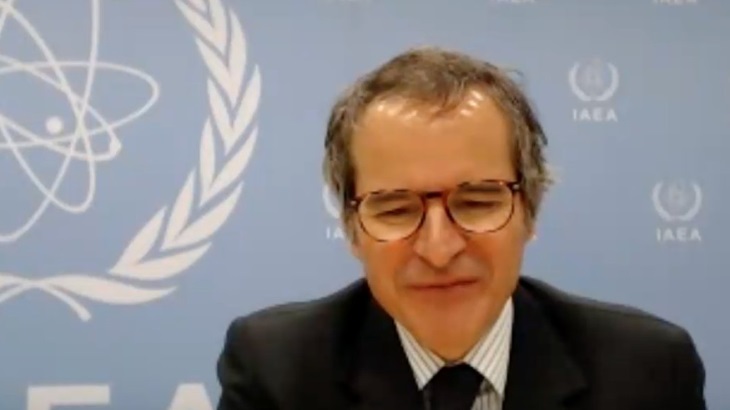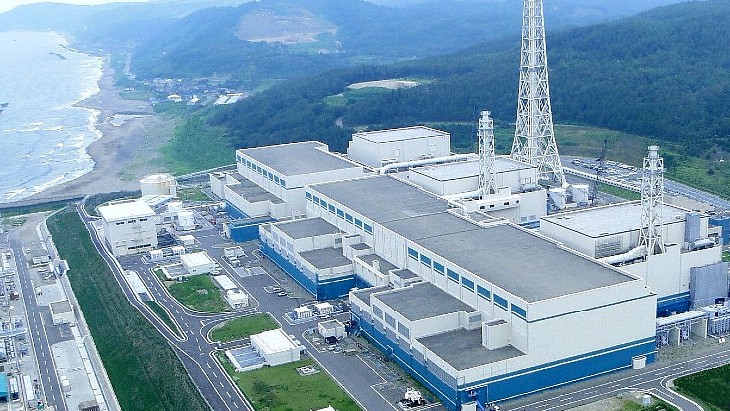The Vienna-based agency was created in 1956 as the world's Atoms for Peace organisation within the United Nations family. From the beginning, it was given the mandate to work with its Member States and multiple partners worldwide to promote safe, secure and peaceful nuclear technologies. The objectives of the IAEA's dual mission - 'to promote and control the atom' - are defined in Article II of the IAEA Statute.
Grossi's predecessor, the late Yukiya Amano, amended the IAEA's motto to Atoms for Peace and Development which aligned the agency more closely with other UN bodies working on the 17 goals for sustainable development. Under his leadership, the IAEA also stepped up its support to countries looking to introduce nuclear power in their energy mix.
At a crossroads
Within weeks of becoming the new director general of the Vienna-based organisation, Grossi attended the UN's latest round of climate talks, COP25, which was held in December 2019, in Madrid. He will also attend COP26 in Glasgow this November.
"The IAEA has a very clear mandate but it is at a crossroads of the normative, promotional, standards-setting, consulting and technical cooperation for our 172 and soon-to-be 173 Member States," Grossi said. "This is a unique perspective and a great opportunity as well. Maybe in the past things were a bit more subdued but of course institutions have to adapt to the signs and challenges of the times. We are at a moment where we are confronted at the global level by a number of challenges. These include the enormous challenge of climate change and global warming that is compounded now by the need to devise and construct a better economy after the year-and-a-half of economic difficulty because of the pandemic."
The number of "converging problems" the world faces demands that "nuclear has a place at the table", he said. Other institutions, such as World Nuclear Association, have a role that is "clearly promotional", he said but the IAEA's own observations confirm that nuclear energy can help address many issues.
"Quite clearly, the operations, activities, aspirations and ambitions of countries depend on a number of circumstances, but the IAEA has a role there to help countries overcome [them]," Grossi said.
The IAEA assists its Member States through a variety of services and activities in addressing all relevant nuclear infrastructure issues, guiding them in the steps required for introducing nuclear energy in a safe and secure manner, and in a way that does not lead to proliferation of nuclear weapons. "More nuclear material requires more controls and more responsibilities," Grossi said.
Virtuous cycle
"We are looking at all these phenomena in a constructive way. The IAEA wants to help and to play a part in this cycle which I believe is starting to show more and more the features of a virtuous - as opposed to a negative - cycle in terms of the acceptance and even the desire for nuclear energy. Many countries, particularly developing countries, come to us because, apart from all these missions and functions, which are more formal and institutionalised at the IAEA, we are for many countries sort of a consultant that they come to when they have to assess and analyse the possibility; even vendors, because of course vendors try to sell their technology and the nuclear industry is there to support them. But countries come to us, they ask for options, they ask for evaluations, and rightly so because they are paying their contributions and the IAEA is there to guide them well."
The dialogue at the WNFC forum is an excellent example, he said, of a conversation between the various organisations in the nuclear sector that can "bring perspective and a contribution to today's situation", he said.
"There has been a change in approach, which I believe so far has been welcomed by many, including in places where the IAEA could not normally be, at COP conferences and things like that, where it was considered an 'exclusion zone' to come with the message from the nuclear sector. We are going to be there, in Glasgow, together with some others, claiming a seat at the table. Nothing more, nothing less.
"COP25 was my debut, if you like. I had only been in office for a few weeks. I was warned that COP25 is not a place where they want to hear from you, but we went and the results were quite interesting. I won’t exaggerate but there was engagement, and we and some others were discussing with the secretary general of the United Nations. The echo and reaction to that I could summarise as: 'Where were you guys?' This doesn't mean they would necessarily agree, or that they would necessarily be big proponents of nuclear energy, but there was recognition that this energy source provides one-third of the clean energy around the world, and so maybe [we] have something to say about all these political discussions about the Nationally Determined Contributions."
Grossi commended the International Energy Agency (IEA) and the presidency of COP26 for their engagement with the IAEA.
"COP25 was the debut and we decided to improve on that, and I must pay tribute to our British colleagues because we started working with them and the president-designate Alok Sharma and others to have a quite visible presence [at COP26], where we are going to try to draw the attention of the participants there to something I like to summarise as three elements," he said.
Grossi had also described these three elements to delegates at the IEA-COP26 Net Zero Summit last month. They are that nuclear energy is a longstanding source of low-carbon electricity, has innovative solutions for further decarbonisation, and it enables renewable energy to be more effective.
"The idea is to draw the attention of the participants in Glasgow to these aspects," he told yesterday's WNFC forum. "We're going to be teaming up with the UK organisers, and also with our colleagues at the IEA. We're also going to be doing something that is not so germane to the debate on energy, but also discuss nuclear technology applications, which are very important to other aspects of climate change, like mitigation, smart agriculture, the use of isotopic techniques and nuclear techniques to have intelligent crops, and water management. We are going to try and show this less well-known side of nuclear technology as a contribution."
On new reactor technologies, Grossi said there needs to be "a dose of realism", with concrete achievements.
"In my regular contacts with many ministers of energy, particularly from developing countries, they are eager to know whether it's this model or that one, which one is going to become operational," he said. "We've been having decades of discussions on Gen IV designs, but what the market needs is answers and viable options. The market is there but we do need to come online."
Facilitating dialogue
IAEA staff are not "industrialists", he said, "we are not selling anything", but they are trying to help. For example, with the setting of safety standards, which are essential and without which the new designs will not have "marketability". "We're doing this with countries and with vendors. We're trying to facilitate this activity."
On the financing options for developing countries interested in adopting nuclear energy, Grossi said: "One has to approach the global nuclear market with a very acute lens because you will see different models and approaches, some of them applicable in the traditional western economic models, some less. But they are all part of the global market and the global nuclear market. If you analyse what may be happening in China, the UAE, Belarus, Turkey and Egypt, you will see the costing and economy of the nuclear activity is different from what you may have in Western Europe and North America, and even perhaps in South America.
"So my observations are that we must approach the nuclear market's variable geometry where there are opportunities but one has to discern the different concerns and characteristics - costing, subsidies, state capital support or the absence thereof. All of these need to be taken into account. Many vendors, especially from the West, need to adjust to that reality in order to have opportunities where there are other models."
In sharing these observations, the IAEA is able to enhance its collaboration with other organisations, he said.
"We have a new circumstance where we all recognise that we are all in this together and we have to analyse from our different perspectives what is needed to really ensure that nuclear energy is sustainable and has opportunities.
"My dialogue with the IEA is very interesting because they didn’t have the opportunity before to work so closely with institutions in nuclear. As I said, we are entering a virtuous, as opposed to a negative, cycle with plenty of opportunity."






_91467.jpg)
_47120.jpg)
_16439.jpg)





